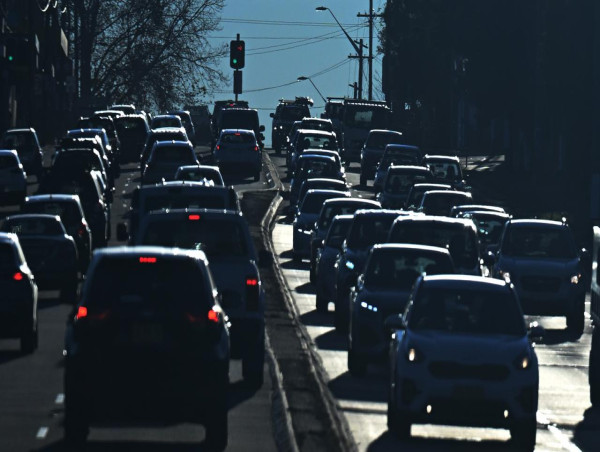Sydney's influential lord mayor has added her voice to calls for the NSW government to introduce congestion charges amid a review of the state's loathed toll road system.
Clover Moore says the time is right for the state government to consider implementing the traffic-busting measure, with record investment in transport infrastructure giving commuters alternative ways to access the CBD.
"I haven't supported congestion taxes in the past because we didn't have adequate public transport, but with the light rail and the metros coming online we do," she told AAP.
Ms Moore said charging drivers to use surface roads but giving them free access to the Cross City Tunnel would further improve pedestrianisation, which has transformed the city centre from a traffic sewer to a leisure and retail destination in its own right.
Transport policy analyst Marion Terrill agrees, saying the incoming Labor government has a "fantastic opportunity" to implement congestion charges as it looks to reshape Sydney's convoluted toll road regime.
Ms Terrill said the pandemic increased work flexibility, reducing the need for workers to enter the city during peak periods and making commuters more responsive to congestion charges.
Research published by the University of Sydney's Institute of Transport and Logistics Studies last week found workers in Australia's largest city are spending almost a third of their working hours at home, and the study's authors believe this trend is likely to stay.
Additionally, car use has rebounded more strongly than public transport use, so more needs to be done to incentivise leaving the car at home.
Unlike tolls, which push drivers onto local streets and worsen traffic, congestion charges encourage road users to avoid or postpone trips during peak times when possible.
Those who have no option but to drive into the city centre at peak hour benefit from less traffic and quicker travel times.
Ms Terrill, who is director of the Grattan Institute's transport and cities program, said the financial burden from congestion charging would be lower than the current tolling system and would benefit the wider community.
"An awful lot of people in Sydney would agree that the model currently in place is untenable," she said.
Unlike toll roads which are designed to raise as much revenue as possible, congestion charges are a "light touch" measure designed to enforce efficient road usage.
As well as reducing traffic, fewer cars on the road means less greenhouse gas emissions, noise and taxpayer money spent to fix road wear.
A 2019 Grattan study led by Ms Terrill proposed a cordon around the Sydney city centre that would charge drivers $5 during peak times and $3 on either side.
Modelling found it would generate $84 million in annual revenue, well short of the $835 million toll operator Transurban collected from Sydney drivers in the six months to February.
The proposed model would also eliminate inequality baked into the existing system by charging everyone a fixed cost, regardless of the length of their commute.
Drivers from lower socio-economic areas in the city's fringes currently face a higher burden than inner-city residents, who are better served by public transport and are less reliant on toll roads.
A two-way commute from the northwest Sydney suburb of Marsden Park to the city centre can set back drivers over $50.
Incoming roads minister John Graham has announced a wide-ranging review of Sydney's toll network headed by former Australian Competition and Consumer Commission chair Allan Fels.
Speaking to reporters last week, Dr Fels appeared to leave the door slightly ajar for the review to investigate congestion charges, saying there "may or may not be scope".
"We'll certainly look at some congestion issues," he said.
But a spokeswoman for Mr Graham played down that possibility, telling AAP the review's yet-to-be-released terms of reference would focus solely on tolls.
Ms Terrill cautioned it would be extremely difficult to untangle Sydney's complex web of toll contracts.
She said she felt the community was at the end of its tether when it came to tolls and was likely to be opposed to any proposed road charges, at least initially.
While the scheme would be a first for Australia, London's successful congestion pricing system shows how it can be done.
"People are pretty wary about it because they can see the costs but what they can't see in advance are the benefits," Ms Terrill said.
"It's often the case that when people see it in action they realise that it's very effective and become very supportive."



